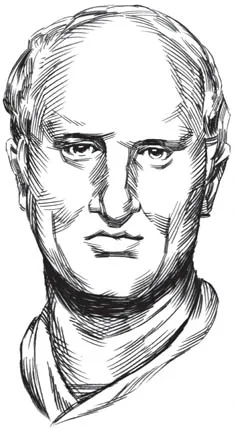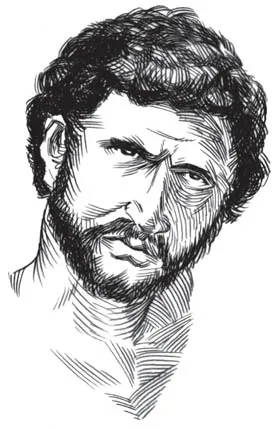![]()
1
Cicero
Enemy of the State, Friend of Liberty
Question: If you could go back in time and spend an hour in conversation with ten people—each one separately and privately—whom would you choose?
My list isn’t exactly the same from one day to the next, but at least a couple of the same names are always on it, without fail. One of them is Marcus Tullius Cicero. He was the greatest citizen of the greatest ancient civilization, Rome. He was its most eloquent orator and its most distinguished man of letters. He was elected to its highest office. More than anyone else, Cicero introduced to Rome the best ideas of the Greeks. More of his written and spoken work survives to this day—including hundreds of speeches and letters—than that of any other historical figure before AD 1000. Most important, he gave his life for peace and liberty as the greatest defender of the Roman Republic before it plunged into the darkness of a “welfare-warfare” state.
Cato Institute scholar Jim Powell opened his remarkable book The Triumph of Liberty: A 2,000-Year History, Told Through the Lives of Freedom’s Greatest Champions with a chapter on this Roman hero—a chapter he closed with this fitting tribute: “Cicero urged people to reason together. He championed decency and peace, and he gave the modern world some of the most fundamental ideas of liberty. At a time when speaking freely was dangerous, he courageously denounced tyranny. He helped keep the torch of liberty burning bright for more than two thousand years.”
Who wouldn’t want to have an hour with this man?
Father of the Country
Cicero was born in 106 BC in the small town of Arpinum, about sixty miles southeast of Rome. He began practicing law in his early twenties. His most celebrated case required him to defend a man accused of murdering his father. He secured an acquittal by convincing the jury that the real murderers were closely aligned to the highest public officials in Rome. It was the first but not the last time that he put himself in grave danger for what he believed to be right.
In 70 BC, ten years after his victory in that murder trial, Cicero assumed a role uncommon for him—that of prosecutor. It was a corruption case involving Gaius Verres, the politically powerful former governor of Sicily. Aggrieved Sicilians accused Verres of abuse of power, extortion, and embezzlement. The evidence Cicero gathered appeared overwhelming, but Verres was confident he could escape conviction. His brilliant defense lawyer, Hortensius, was regarded as Cicero’s equal. Both Verres and Hortensius believed they could delay the trial a few months until a close ally became the new judge of the extortion court. But Cicero outmaneuvered them at every turn. Verres, all but admitting his guilt, fled into exile. Cicero’s speeches against him, In Verrem, are still read in some law schools today.
Roman voters rewarded Cicero with victory in one office after another as he worked his way up the ladder of government. Along the way, the patrician nobility of Rome never quite embraced him because he hailed from a slightly more humble class, the so-called equestrian order. He reached the pinnacle of office in 63 BC, when, at age forty-three, Romans elected him coconsul.
The consulship was the republic’s highest office, though authority under the Roman Constitution was shared between two coequal consuls. One could veto the decisions of the other, and both were limited to a single one-year term. Cicero’s coconsul, Gaius Antonius Hybrida, was so overshadowed by his colleague’s eloquence and magnetism that he’s but a footnote today. In contrast, Cicero emerged as the savior of the republic amid a spectacular plot to snuff it out.
The ringleader of the vast conspiracy was a senator named Lucius Sergius Catiline. This disgruntled, power-hungry Roman assembled an extensive network of fellow travelers, including some fellow senators. The plan was to ignite a general insurrection across Italy, march on Rome with the aid of mercenaries, assassinate Cicero and his coconsul, seize power, and crush all opposition. Cicero learned of the plot and quietly conducted his own investigations. Then, in a series of four powerful orations before the Senate, with Catiline himself present for the first, he cut loose. The great orator mesmerized the Senate with these opening lines and the blistering indictment that followed: “How long, O Catiline, will you abuse our patience? And for how long will that madness of yours mock us? To what end will your unbridled audacity hurl itself?”
Before Cicero was finished, Catiline fled the Senate. He rallied his dwindling army but was ultimately killed in battle. Other top conspirators were exposed and executed. Cicero, on whom the Senate had conferred emergency power, walked away from that power and restored the republic. He was given the honorary title of Pater Patriae (Father of the Country).
“I Shall Not Tremble”
But Rome at the time of the Catilinarian conspiracy was not the Rome of two or three centuries earlier, when honor, virtue, and character were the watchwords of life. By Cicero’s time, the place was rife with corruption and power lust. The outward appearances of a republic were undermined daily by civil strife and a growing welfare-warfare state. Many who publicly praised republican values were privately conniving to secure power or wealth through political connections. Others were corrupted or bribed into silence by government handouts. Cicero’s voice was soon to be drowned out amid political intrigue, violence, and popular apathy.
In 60 BC, Julius Caesar, then a senator and military general with boundless ambition, tried to get Cicero to join a powerful partnership that became known as the First Triumvirate, but Cicero’s republican sentiments prompted him to reject the offer. Two years later and barely five years after crushing Catiline’s conspiracy, Cicero found himself on the wrong side of senatorial intrigue. Political opponents connived to thwart his influence, resulting in a brief exile to northern Greece.
He returned to a hero’s welcome but retired to his writing. Over the next decade he gifted the world with impressive literary and philosophical work, one of my favorites being De Officiis (“On Duties”). In it he wrote: “The chief purpose in the establishment of states and constitutional orders was that individual property rights might be secured.… It is the peculiar function of state and city to guarantee to every man the free and undisturbed control of his own property.”
Politics, however, wouldn’t leave Cicero alone. Rivalry between Caesar and another leading political figure and general, Pompey, exploded into civil war. Cicero reluctantly sided with the latter, whom he regarded as less dangerous to the republic. But Caesar triumphed over Pompey, who was killed in Egypt, and then cowed the Senate into naming him dictator for life. A month later, Caesar was assassinated in the Senate by pro-republican forces. When Mark Antony attempted to succeed Caesar as dictator, Cicero spearheaded the republican cause once again, delivering a series of fourteen powerful speeches known as the Philippics.
Cicero’s oratory never soared higher. Antony, Cicero declared, was nothing but a bloodthirsty tyrant-in-waiting. “I fought for the republic when I was young,” he said. “I shall not abandon her in my old age. I scorned the daggers of Catiline; I shall not tremble before yours. Rather, I would willingly expose my body to them, if by my death the liberty of the nation could be recovered and the agony of the Roman people could at last bring to birth that with which it has been so long in labor.”
Antony and his fellow conspirators named Cicero an enemy of the state and sent the assassin Herennius to take him out. On December 7, 43 BC, the killer found his target. The great statesman bared his neck and faced his assailant with these last words: “There is nothing proper about what you are doing, soldier, but do try to kill me properly.”
With one sword stroke to the neck, the life of the last major obstacle to dictatorship was extinguished. At that moment, the five-hundred-year-old republic expired, too, to be replaced by an imperial autocracy. Roman liberty was gone. On the orders of Antony, Cicero’s hands and head were severed and nailed to the speaker’s platform in the Roman Forum. Antony’s wife personally pulled out Cicero’s tongue and, in a rage against his oratory, stabbed it repeatedly with her hairpin.
Powell reports in The Triumph of Liberty that a century after the ghastly deed, the Roman writer Quintilian declared that Cicero was “the name not of a man but of eloquence itself.” Thirteen centuries later, when the printing press was invented, the first book it produced was the Gutenberg Bible; the second was Cicero’s De Officiis. Three more centuries after that, Thomas Jefferson called Cicero “the first master of the world.” And John Adams proclaimed, “All the ages of the world have not produced a greater statesman and philosopher” than Marcus Tullius Cicero.
Giving His Life
For nearly five centuries, the Roman Republic bestowed upon the world a previously unseen degree of respect for individual rights and the rule of law. The unwritten Roman constitution boasted features we would recognize today: checks and balances, the separation of powers, guarantee of due process, vetoes, term limits, habeas corpus, quorum requirements, impeachments, regular elections. They were buttressed by the traits of strong character (virtus) that were widely taught in Roman homes. When the republic expired, the world would not see such wondrous achievements on a comparable scale for a thousand years.
To the moment of his assassination, Cicero defended the republic against the assaults that he knew would send Rome into tyranny. Some might say Cicero’s labors to save the Roman Republic were a waste of time. He gave his life for an ideal that he was able to extend tenuously for maybe a couple of decades.
But if I had an hour with Cicero, I would thank him. I would want him to know of the inspiration he remains to lovers of liberty everywhere, more than two millennia after he lived. I would share with him one of my favorite remarks about heroism, from the screenwriter and film producer Joss Whedon: “The thing about a hero is, even when it doesn’t look like there’s a light at the end of the tunnel, he’s going to keep digging, he’s going to keep trying to do right and make up for what’s gone before, just because that’s who he is.”
And that is exactly who Cicero was.
![]()
2
Cato the Younger
Ambition in the Service of Principle
In the estimations of many historians, two men hold the honor as the most notable defenders of the Roman Republic. Marcus Tullius Cicero was one. Marcus Porcius Cato, or “Cato the Younger,” was the other.
Since there was a “younger,” there must have been an “elder,” too. Cato the Elder was the great-grandfather of the younger. Both men, separated by more than a century, were influential in public office. Think of the elder as the social conservative, concerned in his day with preserving the customs and traditions of Rome. The younger was one of history’s early libertarians, interested more in personal and political liberties, because he believed that if they were lost, nothing else mattered. Both were men of admirable features, but it is this second one to whom I refer in the balance of this essay as simply “Cato.”
By the time of Cato’s birth in 95 BC, the Roman Republic had been in place for four centuries. It had risen from obscurity to political and economic dominance in the Mediterranean. Rome was easily the world’s wealthiest and most powerful society. It wasn’t a libertarian paradise—slavery was a part of its makeup, as it was (even more brutally so) everywhere else—but Rome had taken liberty to a zenith the world had never seen before and wouldn’t see again for a long time after it finally fell.
But all this was hanging by a thread as Cato came of age.
Tyranny’s Implacable Foe
Cato was just five years of age when Rome went to war with its former allies in the Italian peninsula—the so-called Social War. Although the conflict lasted just two years, its deleterious effects were huge. The decades to follow would be marked by the rise of factions and conflict. As power concentrated in the hands of military figures, men in service increasingly placed loyalty to their generals ahead of loyalty to the larger society. A welfare-warfare state was putting down deep roots. The limited government, personal responsibility, and extensive civil society so critical to the republic’s previous success were in a century-long process of collapse. Even many of those who re...







